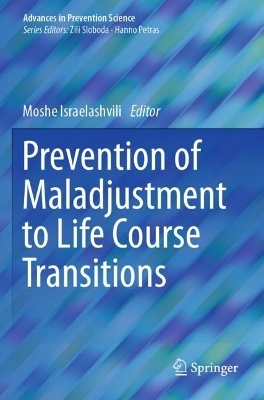
Prevention of Maladjustment to Life Course Transitions
Springer International Publishing (Verlag)
978-3-031-26702-4 (ISBN)
This book provides a comprehensive and updated review of the concepts, models, and interventions related to the process of adjustment to life course transitions.
In times of transition, an individual is exposed to experiences that require them to assume new roles and exhibit updated behaviors. Regardless of the characteristics of these transitions, exposure to normative trajectories imposes on the person an intensive engagement in a process of (re-)adjustment. Sometimes this demand is beyond the scope of one's ability, motivation, or comprehension. Hence, some people might ineffectively perceive and/or react to the change and end up feeling unable to handle the change and inclined to escape the situation. A preventive intervention that either reduces the impact of possible risk factors or fosters possible protective factors would support the people in managing the transition.
While the importance of prevention of maladjustment is repeatedly mentioned in the literature, this is the first-known book on how to prevent maladjustment. It examines how the sense of transition emerges, what adjustment means, the models that elaborate on how people manage in times of transition, what the antecedents of maladjustment are, and especially how maladjustment could be prevented. Out of these discussions, a new model, The Transitional Stress and Adjustment (TSA) Model, is suggested as a grand framework for paving a way forward to better prevent people's maladjustment to life course transitions.
Prevention of Maladjustment to Life Course Transitions is a much-needed cornerstone in the future development within the prevention science framework. This book has interdisciplinary appeal for researchers, practitioners, and graduate students in psychology, sociology, public health, social work, criminology, medicine, health sciences, public policy, economics, and education who consider prevention an important vehicle of intervention to promote health and wellbeing. Its focus on the topic of adjustment also would be of special interest to those who explore child and youth development.
Moshe Israelashvili, PhD, is Professor Emeritus at the School of Education, Tel Aviv University in Israel. His studies focus on prevention of maladjustment, coping skills and resilience promotion. He published over 100 papers and chapters, and co-edited several books, including: The Cambridge Handbook of International Prevention Science (2017, Cambridge University Press; with John L. Romano), Education in the Arab Society in Israel (2020, Mofet; with Fadia Nasser Abu-Alhija) and Youth Without Family to Lean On (2022, Routledge; with Shula Mozes). In recent years he received the International Collaborative Prevention Research Award from the Society for Prevention Research (SPR), the Lifetime Achievement Award in Prevention from the Prevention Section of the Society of Counseling Psychology (APA-Div. 17), and the Lifetime Career Award from the International Stress, Trauma, Anxiety and Resilience Society (STAR).
Part I: Introduction.- 1. The need to prevent maladjustment to life course transitions.- 2. Adjustment to Transitions: Definitions of Terms.- Part II: Adjustment to Transitions.- 3. Theories of adjustment to transitions.- 4. Reconsidering Stage Theories of Adjustment.- 5. Adjustment to Transitions: Common Components.- 6. The Transitional Stress and Adjustment (TSA) Model.- 7. Preliminary Explorations of the TSA Model's Validity.- Part III: Prevention of Maladjustment: Family Context.- 8. The Transition to Parenthood: From Adjustment to Personal Growth.- 9. Adjustment to Divorce.- PART IV: Prevention of Maladjustment: Educational Context.- 10. The Transition to Secondary School: A Definition and Conceptualization of Adjustment During Adolescence.- 11. College Adjustment and Maladjustment.- PART V: Prevention of Maladjustment: Army Context.- 12. Adjustment Following Separation: Prevention of Child Maladjustment Following Parental Deployment to War.- 13. Veteran Transitionto Civilian Life: Leveraging the Strengths of Military Culture.- PART VI: Prevention of Maladjustment: Civilian Context.- 14. Adjustment to Immigration.- 15. Inclusion: Environmental Efforts to Prevent Maladjustment in the Service of Human Growth.- PART VII: Prospective Challenges.- 16. Prevention of Maladjustment: Paving a Way Forward.
| Erscheinungsdatum | 04.06.2024 |
|---|---|
| Reihe/Serie | Advances in Prevention Science |
| Zusatzinfo | XXI, 444 p. 26 illus., 8 illus. in color. |
| Verlagsort | Cham |
| Sprache | englisch |
| Maße | 155 x 235 mm |
| Themenwelt | Geisteswissenschaften ► Psychologie ► Entwicklungspsychologie |
| Studium ► Querschnittsbereiche ► Prävention / Gesundheitsförderung | |
| Sozialwissenschaften ► Soziologie ► Empirische Sozialforschung | |
| Schlagworte | adjustment and maladjustment to transition • adjustment to illness and chronic pain • Bereavement • Child and adolescent development • Divorce • globalization and (mal)adjustment • immigration and relocation • lifecourse transitions • life events and transitions • Marital Adjustment • military enlistment • prevention of problem behaviors • Prevention science • Retirement • school entry and school adjustment • school to college transition • transitions to parenthood • work adjustment |
| ISBN-10 | 3-031-26702-8 / 3031267028 |
| ISBN-13 | 978-3-031-26702-4 / 9783031267024 |
| Zustand | Neuware |
| Informationen gemäß Produktsicherheitsverordnung (GPSR) | |
| Haben Sie eine Frage zum Produkt? |
aus dem Bereich


